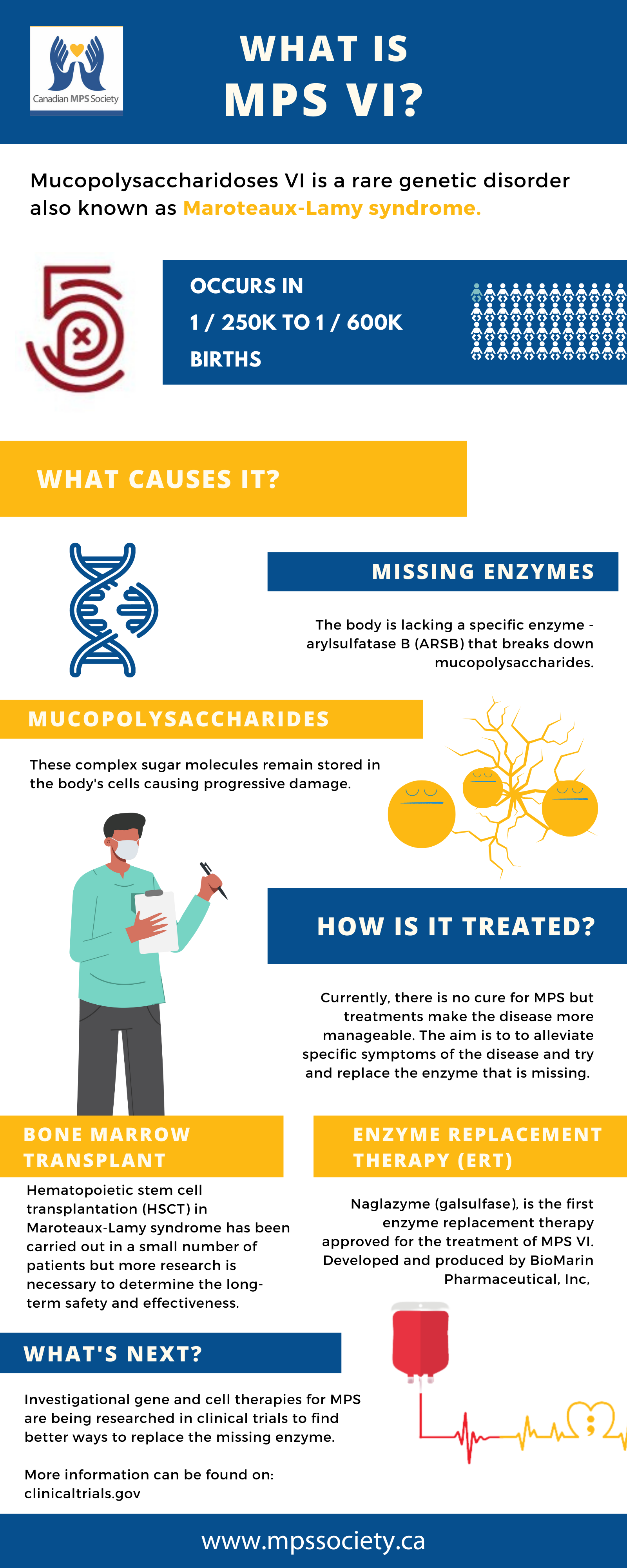
Quick Facts
MPS VI (Maroteaux-Lamy Syndrome)
MPS VI , also known as Maroteaux-Lamy syndrome, is one of the mucopolysaccharide diseases. It takes its name from two French Doctors, Dr. Maroteaux and Dr. Lamy, who first described the condition in 1963.
There is no cure for MPS diseases, but there are ways of managing and treating the problems they cause, including enzyme replacement therapies.
What causes this disease?
Mucopolysaccharides are long chains of sugar molecule used in the building of connective tissues in the body.
- “saccharide” is a general term for a sugar molecule (think of saccharin).
- “poly” means many
- “muco” refers to the thick jelly-like consistency of the molecules
There is a continuous process in the body of replacing used materials and breaking them down for disposal.
Children with Maroteaux-Lamy are missing an enzyme – arylsulfatase B – which is essential in cutting up the mucopolysaccharides called dermatan sulfate.
The incompletely broken down mucopolysaccharides remain stored in cells in the body causing progressive damage. Babies may show little sign of the disease, but as more and more cells become damaged, symptoms start to appear.
How common are these diseases?
Maroteaux-Lamy syndrome affects males and females in equal proportion. The prevalence of all forms of MPS is estimated to be 1 in 65,000 births. Although the exact incidence and prevalence of the disorder is unknown, it is estimated to occur in one case in 250.000 to 600,000 individuals.
How is the disease inherited?
We all have genes inherited from our parents which control whether we are tall, short, fair, etc. Some genes we inherit are “recessive,” that is to say we carry the gene but it does not have any effect on our development.
MPS VI (Maroteaux-Lamy syndrome) is caused by a recessive gene. If an adult carrying the abnormal gene marries another carrier there will be a one in four chance with every pregnancy that the child will inherit the defective gene from each parent and will be affected with the disease.
There is a two in three chance that unaffected brothers and sisters of MPS VI children will be carriers. They can be reassured, however, as the disease is so rare, the chance of marrying another carrier is very slight provided they do not marry a cousin or other close family member.
Is there a treatment for MPS VI?
Treatments such as enzyme replacement therapies can help make MPS VI a more manageable disease.
Naglazyme (galsulfase), is the first enzyme replacement therapy approved for the treatment of MPS VI. Developed and produced by BioMarin Pharmaceutical, Inc, Naglazyme has been shown to improve mobility capacity.
For more information, visit the treatment website at http://www.naglazyme.com/ or contact BioMarin Patient and Physician Support (BPPS) at bpps@bmrn.com or 866-906-6100.
Is there a cure for MPS VI
At this time there is no cure.
All families of affected children should seek further information from their doctor or a Genetic Counselor.
Back to All Types of MPS >

